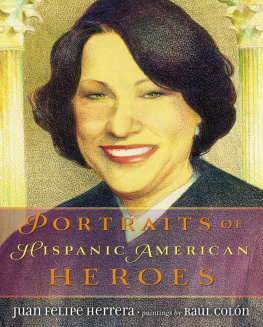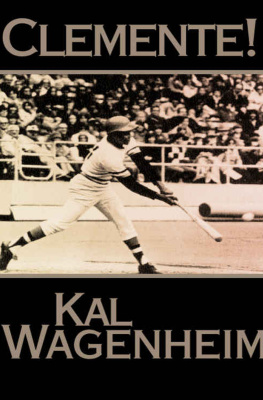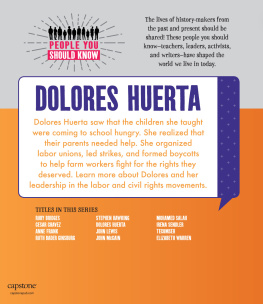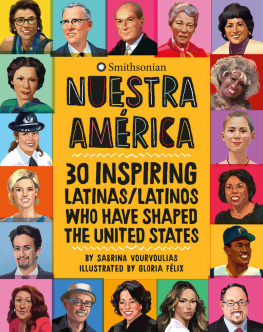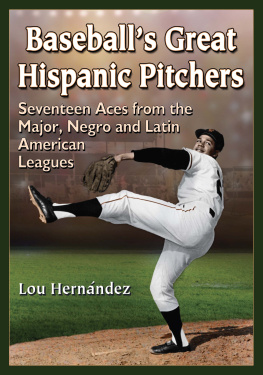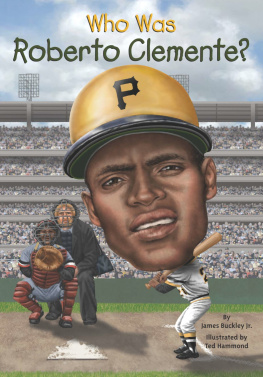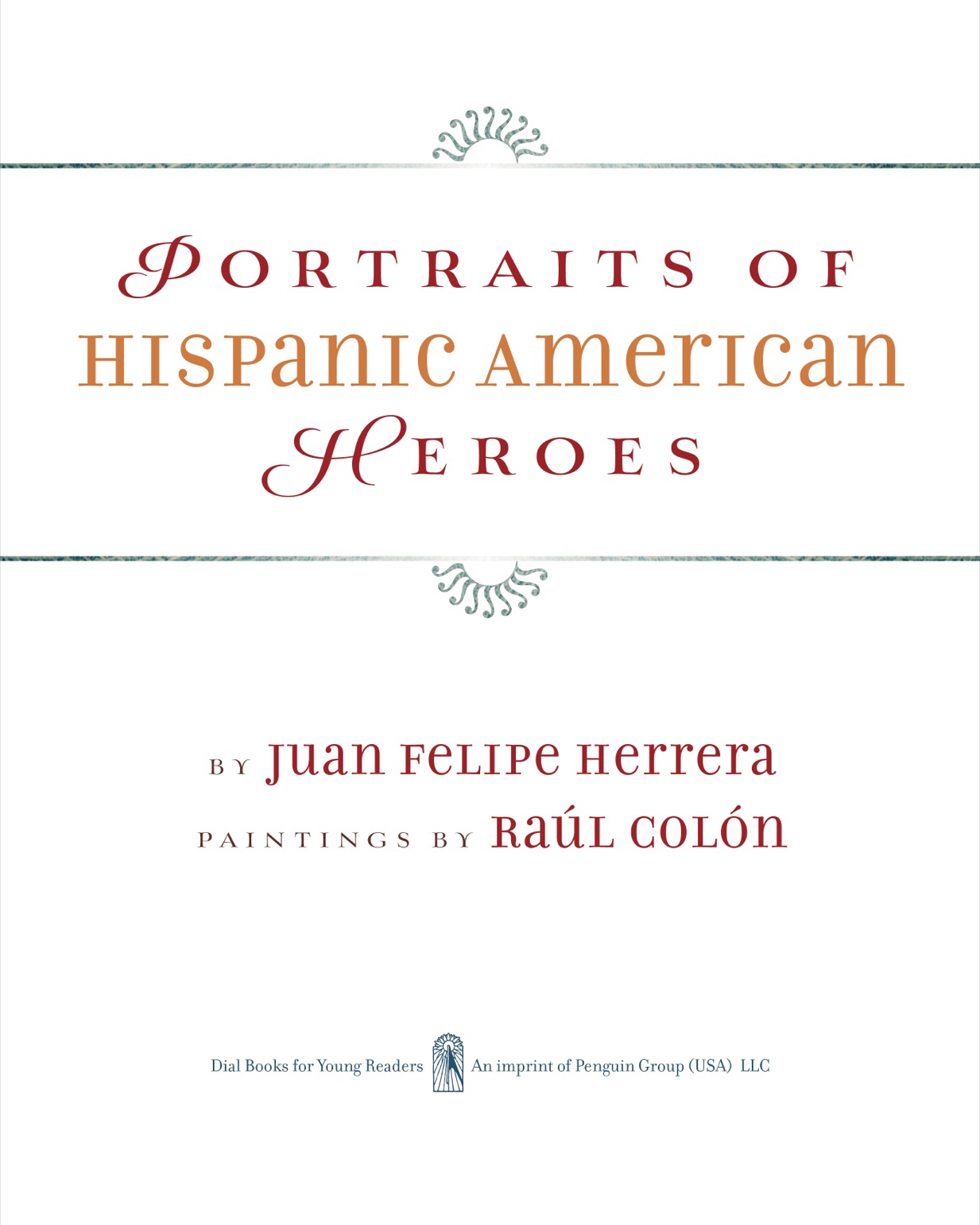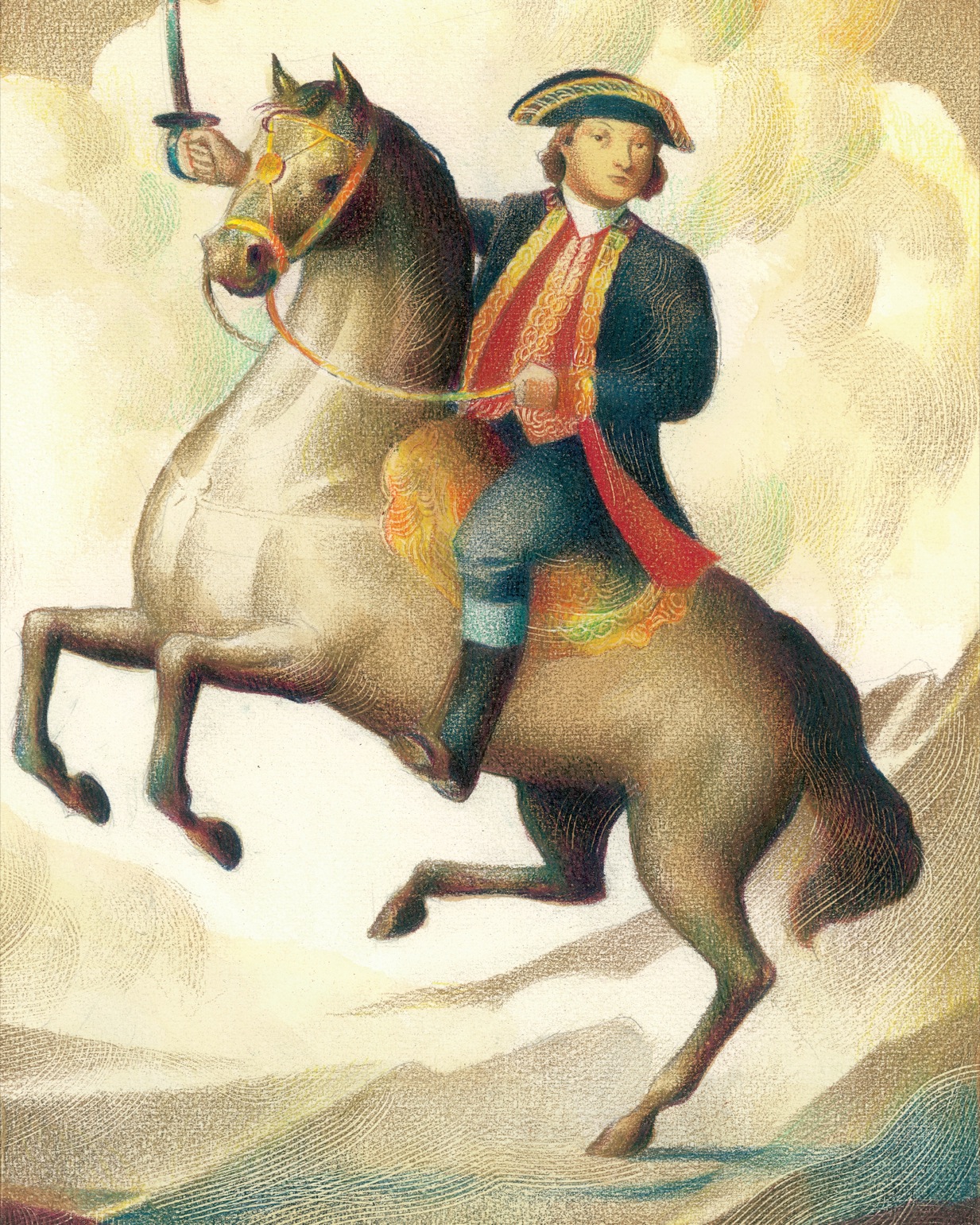Dont be afraid to reach for the stars...
Ellen Ochoa, first Latina astronaut, La Mesa, California
All the boys on Hero Street could hardly wait to serve our country.
Sonny Soliz, Silvis, Illinois
Victoria Soto was one in a million.
Police Chief Gary MacNamara, Newtown, Connecticut
DIAL BOOKS FOR YOUNG READERS
Published by the Penguin Group
Penguin Group (USA) LLC
375 Hudson Street, New York, New York 10014

USA / Canada / UK / Ireland / Australia / New Zealand / India / South Africa / China
penguin.com
A Penguin Random House Company
Text copyright 2014 by Juan Felipe Herrera
Pictures copyright 2014 by Ral Coln
Penguin supports copyright. Copyright fuels creativity, encourages diverse voices, promotes free speech, and creates
a vibrant culture. Thank you for buying an authorized edition of this book and for complying with copyright laws by not reproducing, scanning, or distributing any part of it in any form without permission. You are supporting writers and allowing
Penguin to continue to publish books for every reader.
Library of Congress Cataloging-in-Publication Data
Herrera, Juan Felipe.
Portraits of Hispanic American heroes / by Juan Felipe Herrera ; pictures by Raul Colon.
pages cm
Summary: Twenty Hispanic American artists, scientists, athletes, activists and political leaders are profiled in this stunning picture book, complete with inspirational quotes and distinctive expressionist portraitsProvided by publisher.
ISBN 978-0-698-17920-2
1. Hispanic AmericansBiographyJuvenile literature. I. Coln, Ral, illustrator. II. Title.
E184.S75H486 2014 920.009268dc23 [B] 2013044661
Manufactured in China on acid-free paper
The publisher does not have any control over and does not assume any responsibility for author or third-party websites or their content.
The illustrations are done on watercolor paper and combine watercolor washes, etching, and the use of colored pencils and litho pencils.
Version_1
For my personal heroes, my mother, Lucha Quintana, a singer and poet who wrote her verses on scraps of paper and mesmerized me with our familys stories of survival during the Mexican Revolution; and my father, Felipe Emilio, a courageous man, who in the 1890s, at fourteen years of age, crossed the USMexican border and explored the wonders of the Southwest. For my sisters, Concha Contreras and Sara Chavez, and all my children, grandchildren, and my giant familia . For my agent, Kendra Marcus, and editor, Lucia Monfriedthank you for your guidance and for believing in me. Ral Coln, gracias for your art, making visible the heart of our heroes.
And in memory of my brother, David F. Herrera, and my brother-in-law, Bobby Robles. You are all heroes.
J. F. H.
For Fightin Makenzielittle big girl, welcome to your world.
R.C.
I NTRODUCTION:
H EROES U NDER THE S UN
AND A CROSS THE S TARS
A hero, un hroe, was rarely in my vocabulary growing up as an only child of two tireless and kind California farmworkers. Speaking and reading only Spanish when I began school made my hero discoveries more difficult.
Yet, my library was rich with storytelling and other oral forms of history about Latina and Latino bravery, voyages, and experiments. And it still is the way many Hispanic Americans learn about their heroes. To this day, I sing the corridos,xs ballads of the Mexican Revolucin , that Mam taught me. And my paps harmonicaI play it sweetly.
The Civil Rights Act of 1964 and the grape boycott led by Csar Chvez and Dolores Huerta roused a generation of Latina and Latino students, scholars, and community activists to ask: Are the stories about our Latino and Latina heroes, those who came or were born here in the United States, in our libraries? Most of the books had to be written. And they werefilled with lives in search of change, justice, and innovationand a place they could call home. The books diamond-sparkled with unimaginable heroism.
David Farragut sailed the seas defending the Union, Desi Arnaz was exiled from Cuba. Judy Baca transformed a city with paint! Julia de Burgos arrived on the mainland with a sack of her power poetry about Puerto Rico. Because her skin was brown, Joan Baez figured out another way to become popularand changed our lives. Adelina Otero-Warren fought for bilingual readers; Luis W. Alvarez crushed the armor of atoms; Roberto Clemente slammed his baseball bat for the world; Senator Dennis Chavez demanded civil rights before they were called civil rights. Even in space boundaries had to be challengedEllen Ochoa leaped into the stars as the first Latina astronaut.
In a land of immigrants, it is an irony that Latino lives have been largely ignored. Although there have been incredible contributions by Hispanic Americans since the beginnings of this nation, their pioneering roles often have been overshadowed and their identities besmirched by terms such as alien and illegal.
Crossing borders was a major theme in the lives of the extraordinary heroes in this bookand it is to this day. The boundaries of language still exist, but Hispanic Americans continue to make this nation flourish.
When Toms Rivera gazed at his migrant family struggling in the fields, like mine, rather than smolder in anger, he noticed their unconquerable wisdom to seek out brilliant horizonsthe roots of the hero. May you say hero in many languages. May you become one.
Bernardo de Glvez
B ORN: JULY 23, 1746, IN MLAGA, S PAIN
D IED: NOVEMBER 30, 1786, IN NEW S PAIN (MEXICO TERRITORY)
Born in Macharaviaya, a mountain village in Mlaga, Spain, to a military family, young Bernardo followed his father and uncles into the Spanish royal service. In 1762, at the age of sixteen, he began as a lieutenant in the Spanish army, posted to Portugal, then he fought in New Spain (Mexico territory) and North Africa.
In 1776, the year that the thirteen American colonies declared independence from Britain, Glvez was transferred to the distant province of Louisiana in the new world. The Louisiana Territory, an immense expanse of land, at that time belonged to Spain. It controlled land as far as the Mississippi River, while the British controlled the land along the East Coast and had several posts at the southern end of the colonies.
In Europe, Spain was an ally of France; both were enemies of Great Britain. In the colonies, Glvez pursued Spains interests, which served the American cause. Glvez was familiar with the area along the Mississippi River and the Gulf Coast from his previous postings there. He corresponded directly with American leaders, including Patrick Henry and Thomas Jefferson, and sent bullets, supplies, medicine, and arms up the Mississippi River to aid the colonists. He claimed the town of New Orleans for Spain and drove the British out of the Gulf of Mexico. This meant that American, Spanish, and French ships (France also favored the American colonists) could travel up the Mississippi River to reach the American forces in the north.

